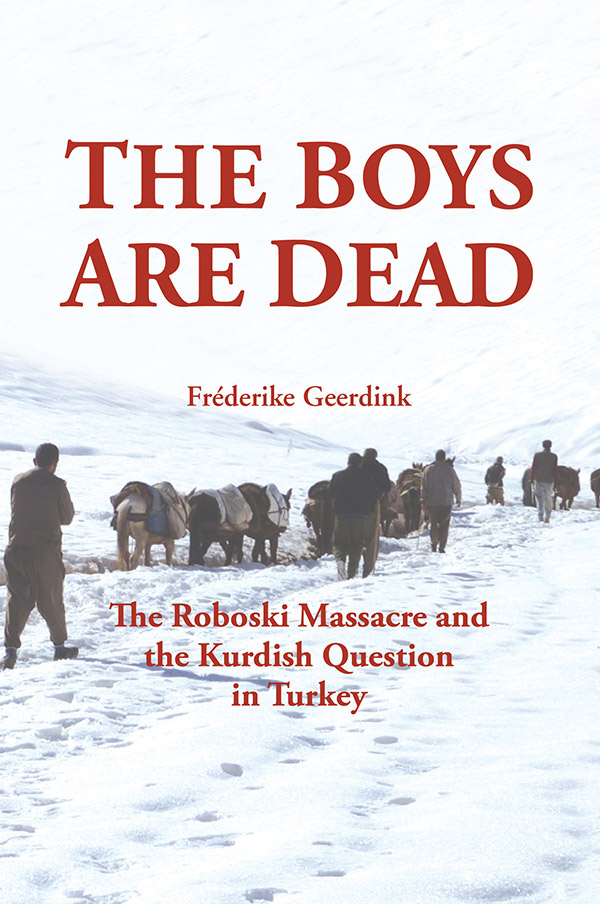
The Boys Are Dead: The Roboski Massacre and the Kurdish Question in Turkey
Fréderike Geerdink
London: Gomidas Institute, 2015,
194 pages, map
ISBN 978-1-909382-19-0, paperback,
Price: UK£16.00 / US$22.00
To order please contact books@gomidas.org
ABOUT THE AUTHOR
Fréderike Geerdink (1970, Hengelo, Netherlands) has been a journalist for 25 years. Since 2006 she is based in Turkey, and since 2012 she is the only foreign journalist permanently based in Diyarbakir, the biggest Kurdish city in the Southeast of Turkey. She writes and makes radio for a wide range of Dutch, Belgian, British and American media, among which The Independent, BBC, Global Post and Al-Monitor. She has a weekly column on the Turkish independent news portal diken.com.tr.
Her book De jongens zijn dood was published in the Netherlands in 2014 and was nominated for the Brusse Prize for best journalistic book of 2014. From the jury report: ‘Fréderike Geerdink is one of those courageous Dutch journalists who do their work in dangerous conflict zones. (...) Her book became a both political and beautiful personal account of the struggle for self determination in Turkish Kurdistan.’
In January 2015, Geerdink was detained by the Anti Terrorism Police in Diyarbakir for ‘making propaganda for a terrorist organisation’. In April, a Diyarbakir court for heavy crimes acquitted her. The state appealed and the court case against her is ongoing. Despite this intimidation, Geerdink decided to stay in Diyarbakir and continue her journalistic work.
TABLE-OF-CONTENTS
Introduction to the English Translation (5)
Chapter One : 28 December 2011, 21:39–22:24 (11)
Chapter Two : The Village (14)
On the Way to the Village: Who Are These Smugglers? (18)
Smuggling With the Army’s Knowledge (22)
How Villagers Became Village Guards (26)
Zevîya, the Ruined Village (29)
The Map of Kurdistan (32)
The Treaty of Sèvres and the Kemalist Revolution (33)
The Uprising of Sheikh Said (37)
Goodbye to the Village (39)
Chapter Three : The People (45)
Return to Gülyazı (46)
My Stay with Pakize, Widow and Mother (48)
Parliamentary Inquiry (51)
The 1930s: Dersim Massacre (54)
The Surrender of Seyid Riza (56)
Kurdish Lessons (58)
The Word for ‘Salt’ (60)
What is a Kurd? (62)
Minorities in the Treaty of Lausanne (63)
‘We are Kurds!’ (66)
The Kurdistan Revolutionaries and the PKK (68)
The 1980s: a Military Reality (70)
A Suburban Neighbourhood in Hengelo (73)
A Dutch Woman Abroad (75)
Identity is Multi-Faceted (78)
At the Yayla with the Women (80)
Banners at the Cemetery (83)
Pakize’s Tears (84)
The Airstrike as a Pawn in a Political Game (86)
The Rash (88)
Chapter Four : The Mountains (91)
Scouts and Smugglers (91)
On the Smuggling Trail (94)
Smuggling, the Government and the PKK (96)
The Marijuana Fields of Lice (99)
The PKK, a Child of the Turkish Left Movement (103)
Students in the Kurdish movement (106)
The PKK – to Join the Struggle or Not? (109)
A Suspect in the KCK Case (111)
Courtroom farce (112)
‘They’re ruining our lives’ (115)
My Position as a Journalist (117)
Am I Becoming Too Pro-Kurdish? (120)
The Kurdish Press Fills a Vacuum (122)
The Air Strike: a Deliberate and Targeted Operation (124)
The Man Politically Accountable: Prime Minister Erdoğan (127)
Moving to Diyarbakır (129)
Bedel Encü: to the Mountains (131)
Chapter Five : The Earth (133)
The Parliamentary Investigation: More Questions Than Answers (134)
The Investigation: Dominated by Secrecy (138)
Newroz 2013: the Peace Process Begins (141)
Ceasefires and the Oslo Process (2008-2011) (143)
‘Democratic modernity’ (146)
The Unsolved Murders of the 1990s (148)
The Army Death Squads (149)
A Centre of Expertise for Disappearances (151)
The 500th Day After the Bombing (154)
Chapter Six : The Horizon (157)
Lamentation for Pakize’s husband (158)
Apologies for Dersim – and for Uludere? (160)
The State Protects Itself (163)
The Myth Regarding the Turkish Legal System (165)
Kurdish State Television: Content-Free TV (166)
Peoples Have the Right to Self-Determination (169)
The EU and the Kurdish Struggle (172)
An Anti-Kurdish International System (174)
An Independent Kurdistan: a Dream for the Distant Future (177)
Political Struggle and Personal Grief (179)
December 2012: the First Commemoration (182)
Post-Script (185)
About place names (187)
Crowd Funding (188)
Bibliography (190)
Map of Predominantly Kurdish Inhabited Areas of the Middle East (193)
About the Author (194)
More information:
www.twitter.com/fgeerdink
www.kurdishmatters.com
www.journalistinturkey.com
www.beaconreader.com/frederike-geerdink